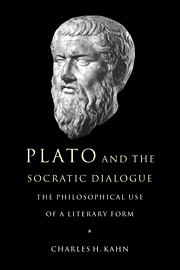Book contents
- Frontmatter
- Contents
- Preface
- List of abbreviations
- 1 Sōkratikoi logoi: the literary and intellectual background of Plato's work
- 2 The interpretation of Plato
- 3 Socrates
- 4 Plato as a minor Socratic: Ion and Hippias Minor
- 5 Gorgias: Plato's manifesto for philosophy
- 6 The priority of definition: from Laches to Meno
- 7 Charmides and the search for beneficial knowledge
- 8 Protagoras: virtue as knowledge
- 9 The object of love
- 10 The emergence of dialectic
- 11 The presentation of the Forms
- 12 Phaedrus and the limits of writing
- Appendix On Xenophon's use of Platonic texts
- Bibliography
- Indexes
1 - Sōkratikoi logoi: the literary and intellectual background of Plato's work
Published online by Cambridge University Press: 02 November 2009
- Frontmatter
- Contents
- Preface
- List of abbreviations
- 1 Sōkratikoi logoi: the literary and intellectual background of Plato's work
- 2 The interpretation of Plato
- 3 Socrates
- 4 Plato as a minor Socratic: Ion and Hippias Minor
- 5 Gorgias: Plato's manifesto for philosophy
- 6 The priority of definition: from Laches to Meno
- 7 Charmides and the search for beneficial knowledge
- 8 Protagoras: virtue as knowledge
- 9 The object of love
- 10 The emergence of dialectic
- 11 The presentation of the Forms
- 12 Phaedrus and the limits of writing
- Appendix On Xenophon's use of Platonic texts
- Bibliography
- Indexes
Summary
THE SOCRATIC LITERATURE
We begin this study of Plato's Socratic dialogues with a survey of what is known about other Socratic writings in the same period. That is not a familiar starting-point. In other fields, and notably in biblical scholarship, genre studies have become commonplace. Students of the New Testament, for example, have found it fruitful to compare the literary form of narrative and discourses in the different Gospels. It may come as a surprise, then, to realize that (as far as I can tell) there has never been a comparative study of the Socratic dialogue form. This may be due in part to the mistaken belief that Plato was not only the perfecter but also the inventor of this form. But such was certainly not the case. Aristotle in his Poetics refers to the Sōkratikoi logoi (“Socratic discourses,” or “Conversations with Socrates”) as an established literary genre. And in his lost dialogue On Poets Aristotle is said to have named a certain Alexamenos of Teos as the originator of this genre. Unfortunately, nothing more is known of Alexamenos.
What is known is that quite a number of friends and followers of Socrates celebrated his memory in literary form, after his death. Aside from Plato's work, only the writings of Xenophon have survived intact. Nevertheless, we have significant remains from at least four other Socratic authors: Antisthenes, Aeschines, Phaedo, and Eucleides. And we have at least anecdotal information concerning a fifth author, Aristippus. Until recently the fragmentary material for these other “minor Socratics” had rarely been studied with care.
- Type
- Chapter
- Information
- Plato and the Socratic DialogueThe Philosophical Use of a Literary Form, pp. 1 - 35Publisher: Cambridge University PressPrint publication year: 1997



